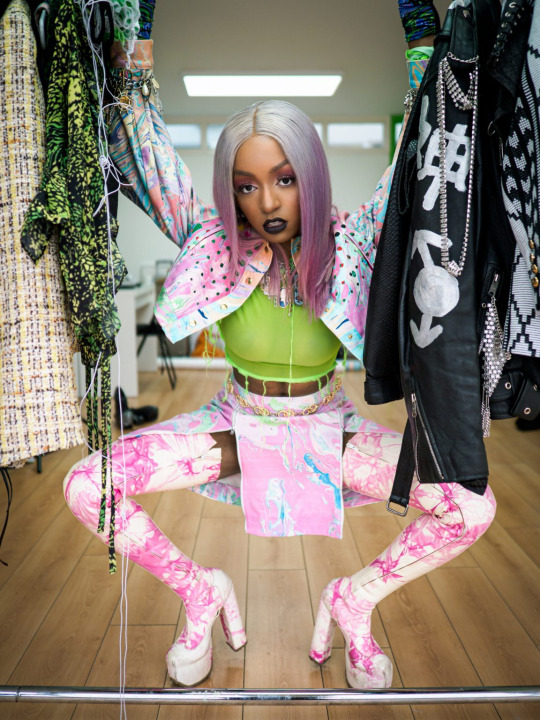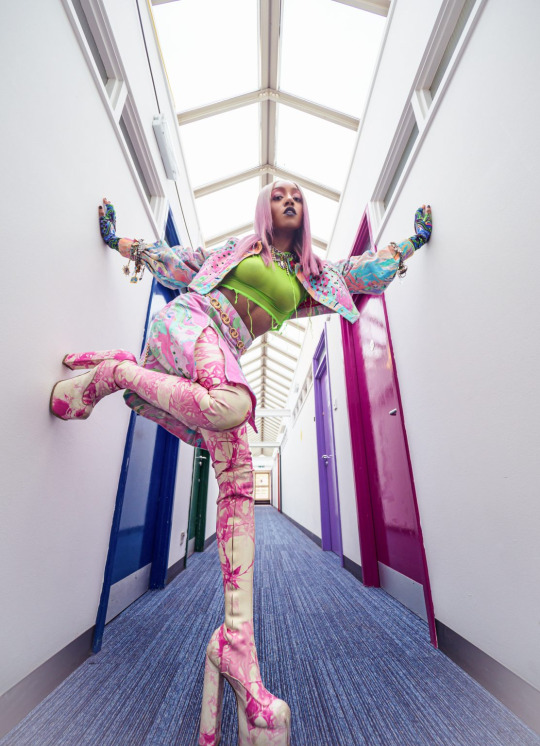#unicorn zine
Not gonna lie, I was pretty dang star-struck when I spoke with Yasmin Benoit. She’s an internationally recognised alternative model, academic and LGBTQ+ activist. Yasmin identifies as aro-ace, which is short for aromantic asexual. Through modelling, public speaking, writing and research, she’s shaking up the mainstream perception of these queer identities in massive ways, as well as promoting the visibility of queer people in colour.
U: Hi Yasmin! For those readers who may be less familiar, could you give us a description of what it means to be ‘aro-ace’?
Y: I’m sure you’ll find some people with different meanings, but asexuality is most commonly defined as experiencing little-to-no sexual attraction. Some resources mistakenly say that it’s having no sexuality, or no sexual feelings or desires, but it has nothing to do with that. It’s specifically about experiencing a lack of sexual attraction. It’s a sexual orientation, just one that isn’t really oriented anywhere.
Being aromantic is most commonly defined as experiencing little-to-no romantic attraction. I’ve never been inclined towards romantic relationships, nor do my emotions or connections manifest that way. I place that same energy into platonic relationships. People tend to think that being asexual and aromantic go hand-in-hand, and while it did for me and there is definitely a significant overlap in the communities, there are lots of asexual people who aren’t aromantic and aromantic people who aren’t asexual.

U: You’ve spoken openly about your teenage years, and how friends would ask pretty personal questions about your sexuality before you had discovered the terms ‘asexual’/’aromantic’. Do you think the kinds of questions people ask are shifting now that the terms are more accessible? And if so, how?
Y: Honestly, the questions I get now and the questions I got back then really haven’t changed. The mistakes people make are the same, but since they’re not teenagers, people offline usually aren’t so likely to be as blunt about it. People online, not so much!
Sometimes it seems like asexuality has been caught in some kind of groundhog day.
Like, I can watch interviews that activists did in the media in the early 2000s and the questions they get are the same, albeit delivered in a less politically correct way.
Most people are familiar with the term ‘asexual’ because it’s an old term and it’s been on the outskirts of conversations for decades at least; people just don’t have the inclination or intrigue to look into what it truly means because it’s often treated as an irrelevant aspect of human sexuality. Romantic orientations are still such a new conversation that aromanticism is even further behind asexuality.
U: You’ve achieved a HUGE amount over the course of a few years, from press features to conferences. What is your proudest accomplishment?
Y: It’s quite hard to choose! When you go into things not expecting to achieve much, even the little things feel quite remarkable. If I had to narrow it down, I’d probably say either Prague Pride 2019 or Ace of Clubs in 2019 (that was a good year).
I really like doing the kind of work where I can create in-real-life memories for asexual people in spaces that they wouldn’t usually have.
Prague Pride was my first time working at an international Pride event, I was invited as a special guest and was doing TEDx-style talks and hosting events. It was pretty nerve-wracking doing all of that in a country I’d never been to, so it felt like an achievement that I even managed to pull it off. It was the first time they’d had an asexual special guest and ace-centric events, and it lead to a really big turnout of asexual people and increased our visibility there.
Ace of Clubs was the first ever asexual pop-up bar, which I hosted during London Pride in 2019. It was a two-day event that provided the only asexual space at the entire festival, we had a panel, a projection screen, food, an open bar, music, games… It gave asexual people the chance to meet each other in person – which some had never done before – and party together in a safe space. So I was really proud that I had the chance to bring that to fruition. People still ask me about Ace of Clubs a lot and I still have a lot of lovely supporters in the Czech Republic! Hopefully I can bring the bar back and visit Prague again in the future.

U: You’ve been dubbed the “main face of asexuality.” How does it feel to be called that?
Y: It’s pretty crazy. It isn’t a position I expected to be in and it took me a little too long to realise that people were being serious when they said that! It’s flattering, for sure, if I think of it as recognition for all of the work I’ve been putting in. It’s also quite a lot of pressure, because people are always looking for me to do something incredible and life-changing for everyone. There’s also a lot more eyes on me, regarding what I do, what I say, how I conduct myself, who I work with, what I post etc, which makes it harder for me to just relax and be unguarded as a member of the community. So there’s pros and cons. But it’s an honour to have that kind of recognition and I do my best to use that attention in a way that’s beneficial to the entire community.
U: A focal point of your activism has been to change people’s perceptions of what asexuality looks like through alternative lingerie modelling – which, by the way… ICONIC. You even coined the hashtag #ThisIsWhatAsexualLooksLike. Since you started this journey, what kind of progress have you seen?
Y: Haha, thank you! I like to think there’s been some progress. I think my modelling has allowed me to discuss asexuality in quite sexualised spaces where it wouldn’t usually come up and bring it to the attention of a different audience.
I’ve definitely noticed an increase in asexuality being talked about in sex-positive communities and I’ve been grateful to have the chance to fill that void myself.
The hashtag has really turned into more of a campaign or movement for asexual visibility. It’s become a way for the community to represent themselves without having to rely on the media to do it. It’s been amazing to see it take on a life of its own and be used on so many platforms, including those I don’t use. I think it’s really helped some aces be able to feel more empowered in their self-expression, based on what I’ve heard. It’s also a series that I write for a website called Qwear Fashion, where I interview ace people about their stories and style! It’s on it’s tenth edition now.

U: What does you-time look like for you? What do you do in your spare time – if you have any spare time?!
Y: When your work isn’t structured in a typical 9-5 way, it can be particularly hard to switch off. Spare time often just feels like time when I should be doing something constructive, whether it’s doing extra work on a project or finally answering my Instagram comments. I’m probably spending it playing far too much Sims 4, reading some history book, going out for something to eat or wandering around a forest in the countryside somewhere. The last one really is a treat.
U: So on top of all the other things you’re doing,you’re also a researcher at California State University. Tell us a bit about the sort of research you’re carrying out and the headway that’s happening there.
Y: There’s a researcher at California State University, San Bernardino conducting research into families and relationships among asexual people, I’m part of the research advisory board and their research team. I do the coding and analysis for the transcribed interviews. I was always interested in the academic side of asexuality activism and I’m definitely hoping to get my name on a research paper someday. This is my way of dipping my toes in. And to anyone reading this and thinking, ‘Why get a model to do research?’ I have an MSc Crime Science degree and a BSc Sociology degree, so it’s actually right up my alley!
U: What advice would you give those who are questioning their sexuality based on your experiences?
Y: I guess first and foremost, I’d say that
sexuality isn’t as black and white as we often think it is.
Every single person’s sexuality is different, multi-layered and fluid to some degree. When we’re talking about our sexual orientation, romantic orientation, desire, libido, arousal, preferences, all of those things – there is no blueprint, despite what we’re taught. There is no typical way to experience sexuality. It’s that idea which makes many queer people – including asexual people – feel like they’re abnormal or missing something.
It’s okay to question your sexuality, in fact, it’s healthy to do that. If you want to analyse it, do that, but through the lens that there isn’t necessarily anything wrong with what you are or aren’t experiencing. And if you find a term that helps you describe what you’re feeling and you want to use it, use it! Don’t worry about having to spend your entire life using it. And if you don’t want to use any terminology or label, don’t. You don’t owe anyone a clear-cut answer and it’s entirely possible to live happily without neatly fitting into any of these preconceived sexuality boxes. I do it all the time.
U: And what does a good aro-ace ally look like? What can they do and say to support the aro-ace community?
Y: Include us in conversations, amplify our voices, support our work and help to normalise our experience! If you’re speaking about sexuality and relationships but you aren’t including asexuality or aromanticism then you’re missing out a significant chunk. The latter includes the least amount of effort and actually makes a huge difference.
U: So… what’s next for Yasmin Benoit?
Y: Depending on when this comes out, I’ve got a considerable line-up of talks, online appearances, and photo shoots scheduled for in-or-around Ace Week!* So that’s what’s immediately next. But the fun thing (and the unsettling thing) about my job is that I never know what’s around the corner! There’s some things that should be coming that I can’t announce yet and some I’m actively working towards, but I don’t want to jinx it. With the support and encouragement of the aro/ace community and our allies, I’m sure there’s good things on the horizon!
https://unicornzine.com/cover/the-face-of-aro-ace-lets-get-to-know-yasmin-benoit/
